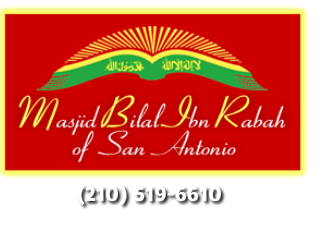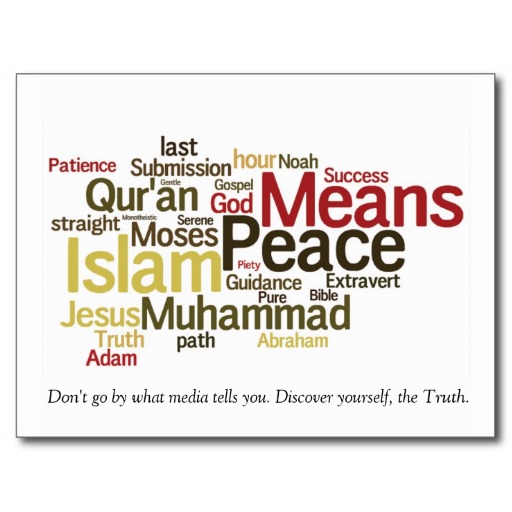What is Islam?The name of The Muslim religion is Al-Islam, (commonly called Islam), which comes from an Arabic root word meaning "peace" and "submission." Islam teaches that one can only find peace in one's life by submitting to Almighty G-d (Allah) in heart, soul and deed. The same Arabic root word gives us "As- Salaamu Alaikum," ("The Peace be on you"), the universal Muslim greeting.
The Muslim concept of worship is very broad. Muslims consider everything they do in life to be an act of worship if it is done according to Allah's guidance. There are also five formal acts of worship which help strengthen a Muslim's faith and obedience. They are often called the "Five Pillars of Islam:" 1. Testimony of faith (Kalimah or Shahadah): This is a formal declaration that one says to acknowledge his or her intent to be a Muslim. This two-part statement affirms that a person believes and will model his or her life around the principles that he or she bears witness that there is no other deity (god) except Allah, (the Creator and Sustainer of all the worlds), and Muhammad (Peace and blessing be upon him, the son of Abdullah, born in Saudi Arabia) is the Messenger of Allah. By making this declaration a person adopts a holistic monotheistic perspective of worship, rejecting any ideas or customs that suggest that the Creator has any partners in creation, knowledge, Divine decisions, and in directing this world, the afterlife and all other realities. A person also affirms that the Prophet Muhammad is a bona fide Messenger of Allah, and therefore he or she accepts all authentic customs and commandments from the Prophet. 2. Formal Prayer (Salat): Prayer in Al-Islam is a practical manifestation of faith and required act of worship. There are five obligatory prayers required everyday as well as additional voluntary prayers that the Prophet Muhammad (peace and blessings be upon) practiced regularly to show an example of excellence in worship. The prayers involve a series of physical movements standing, bowing, and sitting while reciting verses from Al-Qur'an and specific supplications. The supplications feature glorifying the Creator, seeking His protection, and asking for peace for the entire human family of believers of all times. Although the prayer is very ritualistic, it is intensely spiritual. 3. Almsgiving (Zakat): This is the contribution that Muslims give from their wealth and earnings that is redistributed in a way that reduces differences between classes and groups. By understanding that the Creator, Allah, is the sole owner and sustainer of everything in the universe, the Muslim understands that all that is given to him or her is a trust that he or she is expected to discharge in wholesome ways. The standard almsgiving is 2.5% of wealth annually. 4. Fasting (Sawm): The Islamic practice of fasting involves abstaining from lawful things, i.e. eating, drinking, smoking, and sexual intercourse with the spouse between the hours of the break of dawn until sunset. The purpose of fasting is primarily an expression of faithfulness and to purify the body from within. By fasting the Muslim learns a deeper sense of self-restraint, becomes more self-aware, and empathizes with the suffering of those less fortunate. It promotes kindness and sympathy as well as appreciation for one's own circumstances. 5. Pilgrimage (Hajj): Performing the Hajj means a Muslim travels to Makkah, visits the Ka'bah which is the structure built by the Prophet Ibrahim (Abraham) and his son Prophet Isma'il (Ishmael). During this trip certain practices of worship are performed at different times. The pilgrimage gives Muslims from all over the world the opportunity to meet annually for a single purpose. The Hajj is aimed at promoting self-discipline, a unique unity, and equality in that the required dress and rituals are standardized and do not promote distinction by class, nationality, tribe, or race. To learn more, visit, call, or join our mailing list. MBIR also welcomes the opportunity to speak at public events upon request. |
Masjid Bilal Ibn Rabah of San Antonio, P.O. Box 769116, San Antonio, Texas 78245, United States
530 S. WW White Rd., San Antonio, TX 78220
Phone: 210-519-6610, Alternate: 210-414-3185 [email protected]
© Copyright MBIRSA 2013
Website Design: Best Foot Forward Training Transformations
530 S. WW White Rd., San Antonio, TX 78220
Phone: 210-519-6610, Alternate: 210-414-3185 [email protected]
© Copyright MBIRSA 2013
Website Design: Best Foot Forward Training Transformations











